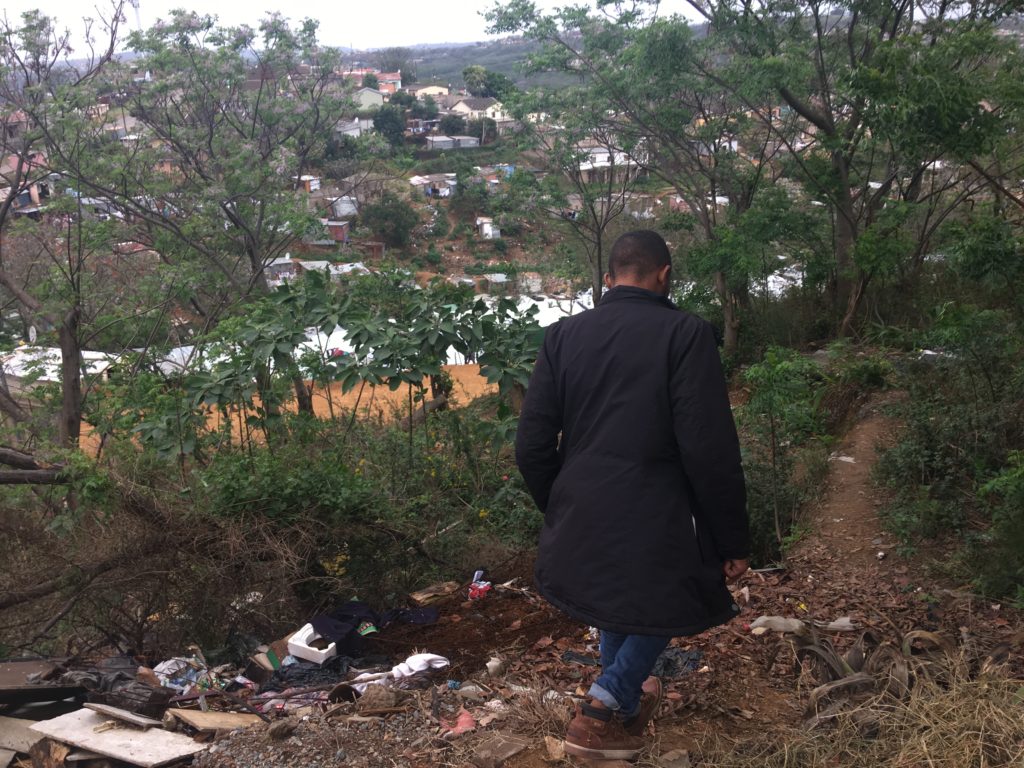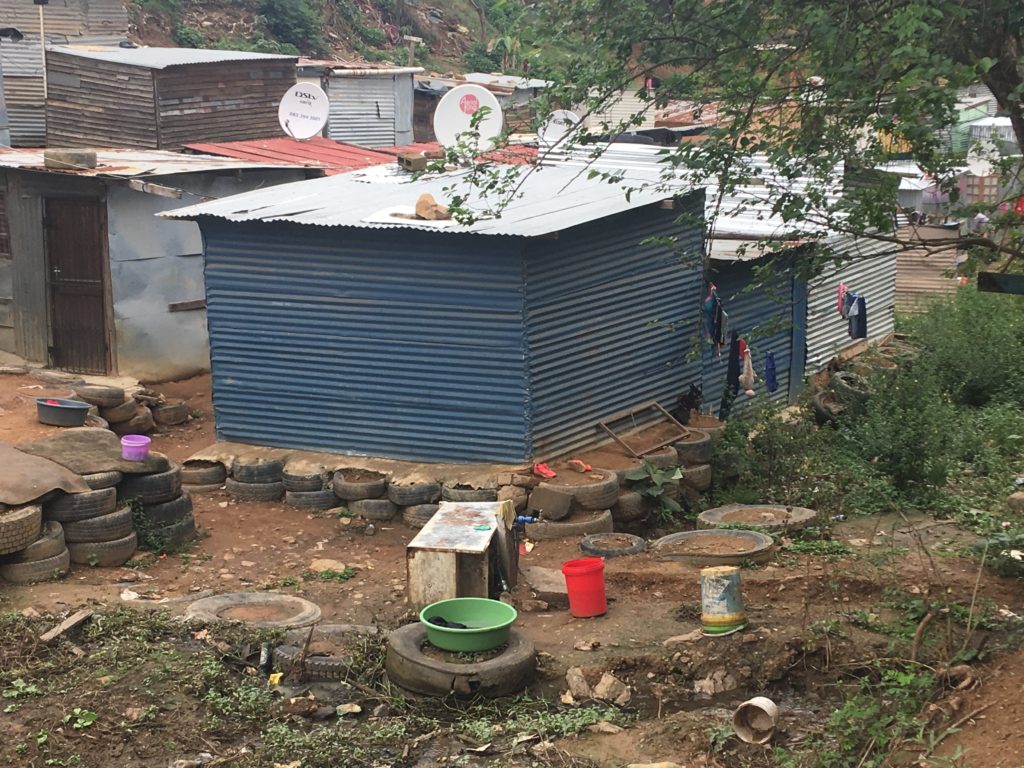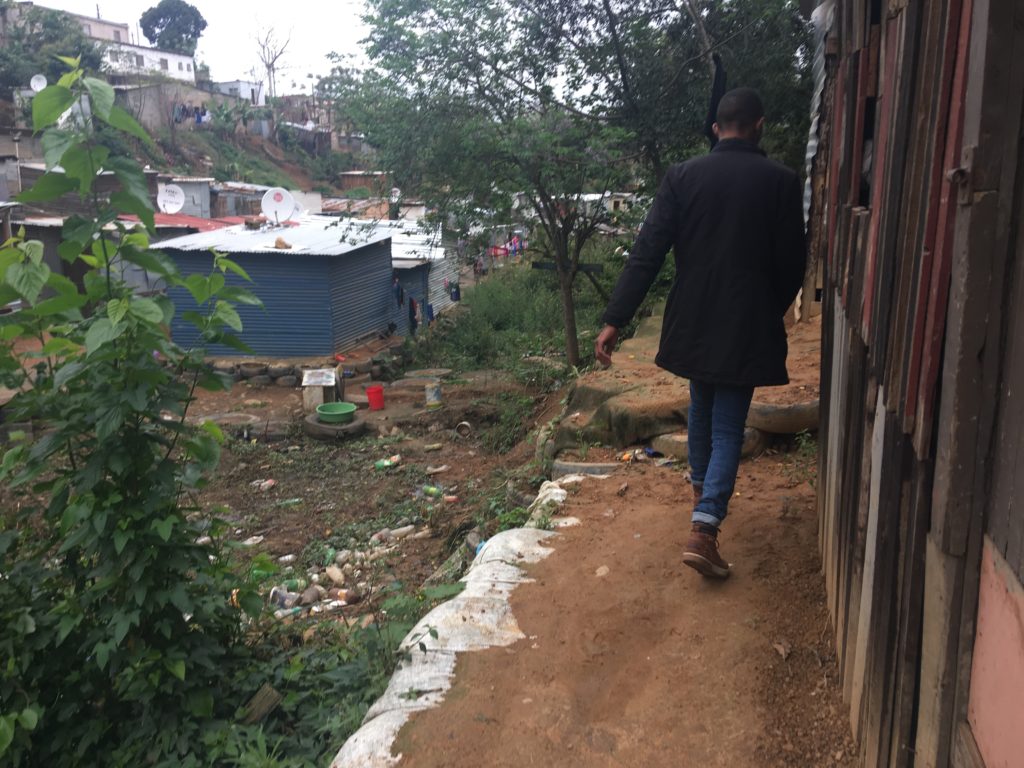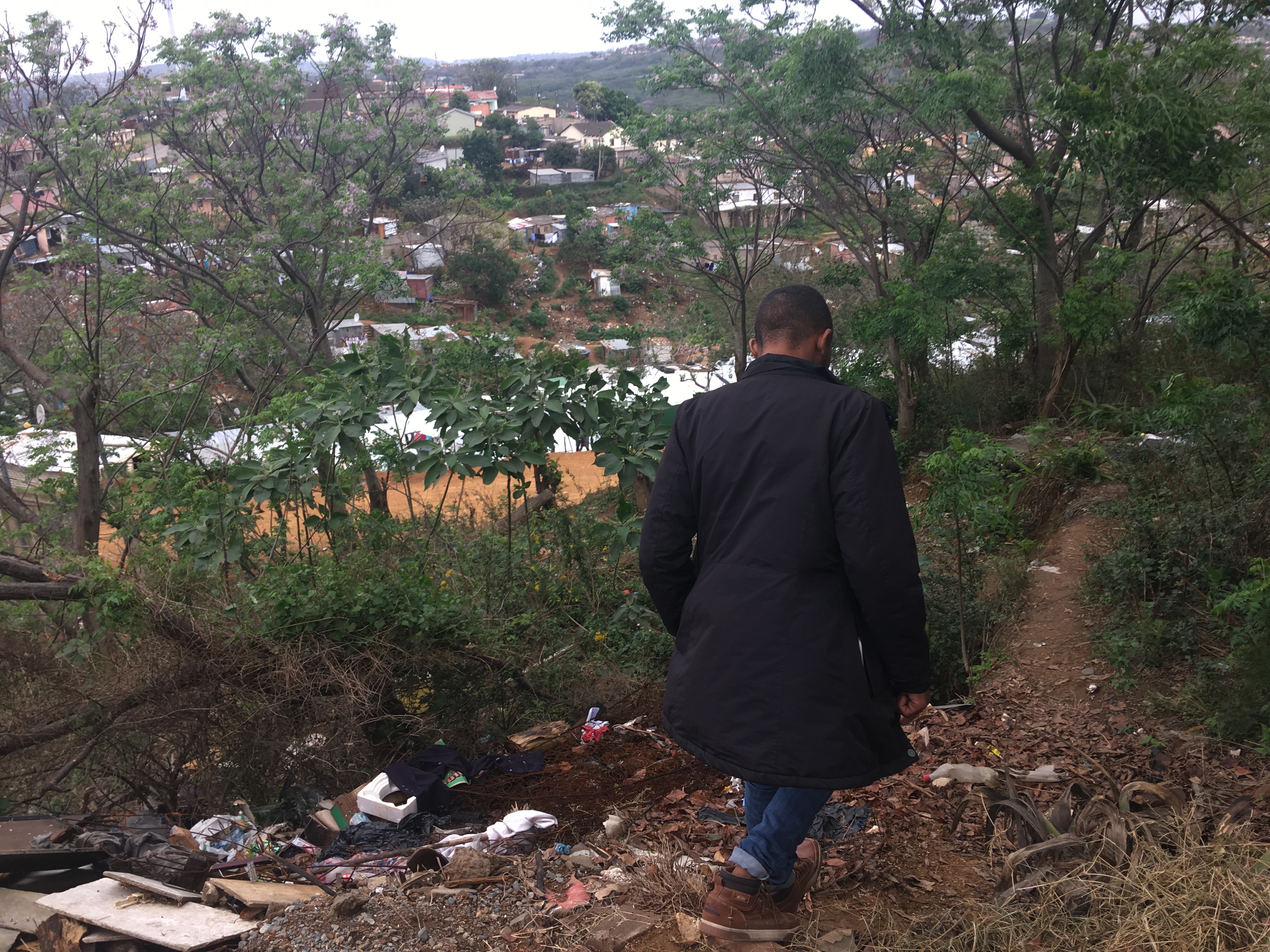Saam Niami Jalinous
All names in this article were altered to protect the altered to protect the privacy of those included.

It’s midnight. I’m with my host brother, Tau, and his friends. They’re all at least five years older than me. They were surprised to find out that I’m only twenty. So far, I’ve impressed them enough with a fashion sense they call “Hollywood,” along with my stories of California and New York, their equivalent to Shangri-La and El Dorado. We’re walking down a hill into the “Shacklands”, the informal settlements outside of Cato Manor. We’re on our way to find a gram of marijuana—or “dagga” in South African slang—paid for with a fistful of R5 in change.
Earlier, my brother asked me for a loan of R200. He seemed desperate: he had taken a loan from someone else a couple months ago and they are keeping his phone as collateral. It specifically says in the program handbook not to give loans to family members; but I am more curious to see where it will take me than worried about getting paid back. He has shown me a number of good times at this point, so I see it less of a loan and more a down payment on the next adventure.
We have to trek down a steep hill to reach the settlements. They make fun of me on the way down. “There’s no Uber in the Shacklands.” I hold my ground. I’m not going to show them I’m scared. I can’t risk exclusion from future exploits.
I end up in the back on the way down. Once we reach the settlement, the two friends in front of me wait for me to pass and join the single file line behind me. I realize as we are walking that I’m an easy target; the locals would most likely assume I’m an Indian who is lost.
If anything goes wrong, one of two things will happen: my brother will tell me what to do and I’ll do it; or, none of them will know what to do and I’m in trouble. So, I just keep quiet and enjoy the scenery.
The shacks are placed closely together with little patches over open areas between a few a time, making for communal recreational areas. I’m not sure whether this was intentional or a product of a rush to build; but the children who run around from house to house during the day tells me that there’s little concern for designated space.
The shacks are all shades and colors, making up for the lack of distinguishable difference between the individual designs. There’s no road between the houses, only little pathways created by the erosion of feet rather than industrial tools.
Before getting the dagga, we stop by a shack. My brother is the only one to go inside. I’m confused as to what is going on. There’s a lot of yelling in Zulu, but as it usually goes here, it’s followed by laughing.

“We have lots of parties here,” one says. “We go for three days at a time. Nonstop. Ecstasy. You can go forever.”
My brother waves at me to come inside. There are two naked women under the covers of a bed. Two small children are playing on top of them. My brother introduces me. He picks up one of the children. “This is my daughter,” he says. “Don’t tell Mama.”
I don’t know whether to believe him or not.
The inside of the shack doesn’t look especially different from the houses in Cato Manor. There are definite faults in the structural integrity: the roof, which is made from large metal sheets, doesn’t meet the walls. Inside the cavities there is a variety of trash and general storage. And, just like the houses in Cato Manor, there’s a large television in the center of the home that is on, and all in the home are passively paying attention to the flashes on the screen.
Someone comes by and drops off Tau’s phone. He shrieks with joy and kisses it. He turns to me, “Brother, two months, two months with no phone. Two months not texting ladies. No cheating for two months, damn!” They all laugh. I laugh as well, but I’m unsure if I feel comfortable enabling his cheating on his girlfriend. I decide it’s none of my business.

We walk up the hill to an alleyway between the houses. Only one of the friends goes in with the R5 in change. I’m looking over the vast expanse of houses.
“They were all built in two months,” says his friend Themba. I give him an expression of shock. Surely I misheard him. “No,” he says, “this all used to be bush. They came in, built the houses, and refused to leave. The government told everyone to leave, but they refused.” He pointed to the power lines that run through all of the shacks. “All of the energy is stolen as well, and the water. All stolen from Cato Manor.”
The more I think about it, the more overwhelmed I become by the beauty. Considering the contrast between the slow-moving monster that is the South African government and the colossal undertaking of building an entire village from scraps and stolen resources in just two months.
“It takes smart people to steal this much resources,” quips Themba. “You can’t build a city if you’re a degenerate.”
My entire view on it all shifts. It is a true marvel of the uniquely human trait of the stubborn will to survive.
Tau asks me why I’m so quiet.
“I’m taking it all in,” I tell him.
We make it back into Cato Manor. As most of my nights with Tau end up, the group of us show up announced at a friend’s house. The most tangible similarity between Tau and all of his friends is that they are in their late twenties and live in small shacks behind their parents’ homes. This isn’t especially foreign to me; there’s a similar expectation that children should be allowed to live at home into their maturity within Persian culture. But, the significance lies in how much they all wish to be somewhere else.
A factory of joints is created without a word. Three different boys at a time are rolling with precision and grace. They light up. The small shack is filled with the five of us who came in and the six others who were there before. Smoke quickly fills the air, mixed with the smell of switcher cigarettes that Tau and I share.
It’s a trend in their group to buy dagga in small, cheap quantities, rather than buying in bulk. It would make more time-conscious to buy it in bulk; but the strategy, usually, is to scrape together R5 from wherever they may. The strategy both makes for a cheaper buying pattern and one of restraint. If they bought in bulk, they’d most likely smoke the whole bag in one go, because a smoke sesh will usually end as soon as the cache is dry.
As usual, they begin to ask me about California, California wealth, and California girls as we watch television. I offer them what I can, sprinkling in hyperbole when appropriate. My role in these hangouts is often that of a foreign storyteller rather than a local assimilate; although, they appreciate my presence nonetheless.
Their romanticized view of America—the beaches, the bikinis—begins to wear on me. I explain to them that America is only coated in gold. I bring up Plato’s Cave Allegory to them, explaining that South Africans are only offered shadows—or, perhaps, blinding lights—of what America is like. I explain the War on Drugs, the intense poverty among blacks, the racism, and the trials of being immigrants in an imperialist nation as my family has experienced. They get more serious. This is an intelligent group. We discuss class and the future of society whose threads are strained by wealth disparity, a topic we can all speak on with abundance.
“All people are Africans,” says Themba. “We all came from this continent. Civilization began in Africa, but we’re made to believe that history began as soon as the white people arrived. A white line has been drawn between centuries of innovation and colonization, and everything before the white line has been thrown away. Hell, even Jesus Christ is presented as a white man. But Jesus was a Jew from the desert!” He laughs and points at me. “He probably looked more like you than the white man we’re made to believe he is! I’d believe he was black before I believe he was white!”
I begin to fall asleep, which is usually how the night ends: the American needs his sleep. As Tau and I leave, we share handshakes with all in the shack, a special South African-brand they taught me.
“Goodbye, goodbye, goodbyyyyyye Sipo! Until the next time!” Yells one, who is extremely high on coke. Sipo is the Zulu name Tau gave me earlier in the day. It means “gift”; although, I can’t help but wonder if I am the gift, or I give the gifts. For now, I’ll settle for both.




